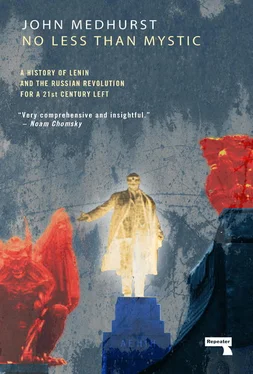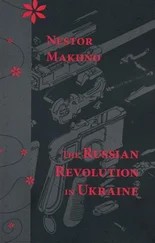Despite the condemnation of the October Insurrection by the Academy of Sciences, most working scientists had stayed on the job. The Bolsheviks, as good materialists, also had a high opinion of the natural sciences. In 1919 when Nakompros proposed to abolish the Academy of Sciences, a plan that generated much anxiety amongst Russian scientists, Lenin called in Lunacharsky and told him “not to break any valuable china”. The plan was quickly shelved. Sovnarcom wanted ideological control but it had no wish to alienate or lose “bourgeois specialists” in hard sciences such as biology, chemistry, engineering, maths and physics. The Soviet state granted these strata privileges which it never withdrew.
The arts and humanities were less protected. Alexander Blok, the great Russian symbolist poet of the pre-war years, initially welcomed the Revolution. He represented its elemental grandeur in two massive new poems, The Twelve and The Scythians . The Twelve , which depicted a dozen tired, blasphemous Red Guards marching through a snowstorm in Petrograd, finally encountering the symbolic figure of Jesus Christ, was hailed as a masterpiece by the new government and was widely reprinted. Trotsky, whose view of Blok’s pre-war work was that it was “romantic, symbolic, mystical, formless and unreal” and would not outlive its author, considered that in The Twelve Blok had come half-way over to the Revolution. He therefore met the “categorical standard”.
This meant nothing to Blok himself, who was appalled by the Red Terror and the Bolsheviks’ hostility to any kind of philosophical idealism. After 1918 he ceased to write and during the Civil War was briefly arrested on spurious charges of anti-revolutionary activity. Trapped in Petrograd in a freezing flat without food, he developed inflammation of the heart and brain. Gorky’s and Lunacharsky’s pleas to the Politburo to allow him to go abroad for treatment were declined. He died in August 1921, following which Lunacharsky wrote in anger to the Politburo, “There will be no doubt and no refutation of the fact that we killed Russia’s most talented poet”. 29
Trotsky was less concerned. In an appreciation written in 1923, he found that Blok “was not one of ours, though he reached towards us”. The reason his creative drive dried up after 1918 was because he could not fully commit to a revolution he did not understand. Trotsky concluded:
The march of history is not adapted to the psychic needs of a romanticist who is struck by the revolution. And to be able to maintain oneself on the temporary sandbanks, one has to have different training, a different faith in the Revolution, an understanding of its sequential rhythms, and not only an understanding of the chaotic music of its tides. 30
The chaotic music struck many others, including the “Acemist” poet Nikolay Gumielov, who did not welcome the Revolution in the same way as Blok, Malevich and Tatlin. In 1920, without state approval, he formed the All Russia Union of Writers and openly derided the Bolsheviks and their cultural policies. Two weeks after Blok’s death, Gumielov and 60 others were arrested as part of a “monarchist conspiracy” against the government (which in 1992 the Russian government admitted was “completely fabricated”). Gorky rushed to Moscow to see Lenin to secure his release. Although Lenin granted this, by the time Gorky got back to Petrograd the Cheka had taken all 61 defendants in the case, including Gumielov, out to the Kovalevsky Forest and shot them. There was no trial. When told he was too late, Gorky coughed up blood.
Russia’s greatest 20th-century poet, Osip Mandelstam, lasted longer, but in the end his fate was crueler. Mandelstam had stayed aloof from politics, content to let the purity of his verse speak for him. His first collection of poems, Stone (1913), had an immediate impact on his contemporaries. It established him as a poetic genius of the first rank who achieved a clarity and emotional precision unequalled in Russian poetry, driven by “a central, controlling simplicity of spirit”. 31Like Gumeilov, he rejected symbolism for verse that was rooted in an imagery of soil and earth and weather. Mandelstam’s values were those of a personal, subjective humanism. Despite his lack of interest in Marxism or the Revolution, he managed to publish a further collection, Tristia , in 1923, mainly because he was under the informal protection of Bukharin, who greatly esteemed his poetry. In 1928 he published a last collection of poems and essays. After that he was under increasing suspicion from the state.
In 1934 Mandelstam read out one of his new poems (now known as “The Stalin Epigram”) to a small gathering he thought he could trust. The poem was a biting view of Stalin’s personal dictatorship. Mandelstam wrote that Stalin “toyed with the tributes of half-men” whilst he “forges decrees in a line of horseshoes”; a malevolent figure,
He rolls the executions on his tongue like berries.
He wishes he could hug them like big friends from home.
But someone present informed on him; he was arrested and tortured. Even though Bukharin was by that time in political purdah and under heavy suspicion, he intervened to ensure Mandelstam was not executed. Instead he was sentenced to internal exile in the Urals. In 1937 he was briefly allowed back to Moscow where he was lost, homeless and half insane. Arrested again for no specific reason he was sentenced to five years’ hard labour in the Gulag. He was last seen alive at a transit camp near Vladivostok.
It was this experience–that of those who could not transform or mutilate their conscience or impulses to a standard set by a political party they did not support–that formed the basis of one of the two great fictional masterpieces to emerge from the post-Civil War years, Yevgeny Zemyatin’s We (the other, although it took much longer to gestate, was Pasternak’s Doctor Zhivago ). Before the war, Zemyatin had been in trouble with the Tsarist state for left-wing sympathies. He spent much of the war in Newcastle, England, before returning to Russia upon hearing of the Revolution. Always individualistic, he was appalled at the direction of the Revolution, believing that writers should be “madmen, hermits, heretics, dreamers, rebels and skeptics”, not “diligent and reliable officials”.
We , written in 1920 and published abroad in 1924, is set a thousand years after the triumph of the One State during the rule of the Benefactor, in which humans are known only by numbers. It tells the story of D-503, an obedient functionary of the One State, who like all citizens lives in a glass house so he can be monitored, is piped to work by canned music from a Music Factory and is constantly watched by the Bureau of Guardians. His only friend, R-13, is a State Poet who recites his verses at state executions. D-503 is content to schedule impersonal sex with a woman called 0-50 until he falls in love with the rebellious I-330, who involves him in the resistance to the One State. By the end D-503 has been brainwashed back into unquestioning submission to the Benefactor and I-330 has been imprisoned by the Guardians, but she tells her captors that they can never win because, like numbers, “revolutions are infinite”.
We is an SF classic, the dystopian flipside of Bogdanov’s Red Star and an enormous influence on Huxley’s Brave New World and Orwell’s 1984 . It was also the first novel to be officially banned in Soviet Russia by the newly established Main Directorate on Literary Affairs and Publishing (Glavlit), an organisation that perfectly reflected the mentality of Lenin’s “Party Organisation and Party Literature”.
On 22nd September, 1922 Dzerzhinsky met Lenin to discuss policy towards the intelligentsia. After the meeting he wrote a record for himself called “Directives from Vladimir Ilyich”. The notes recorded:
Читать дальше












